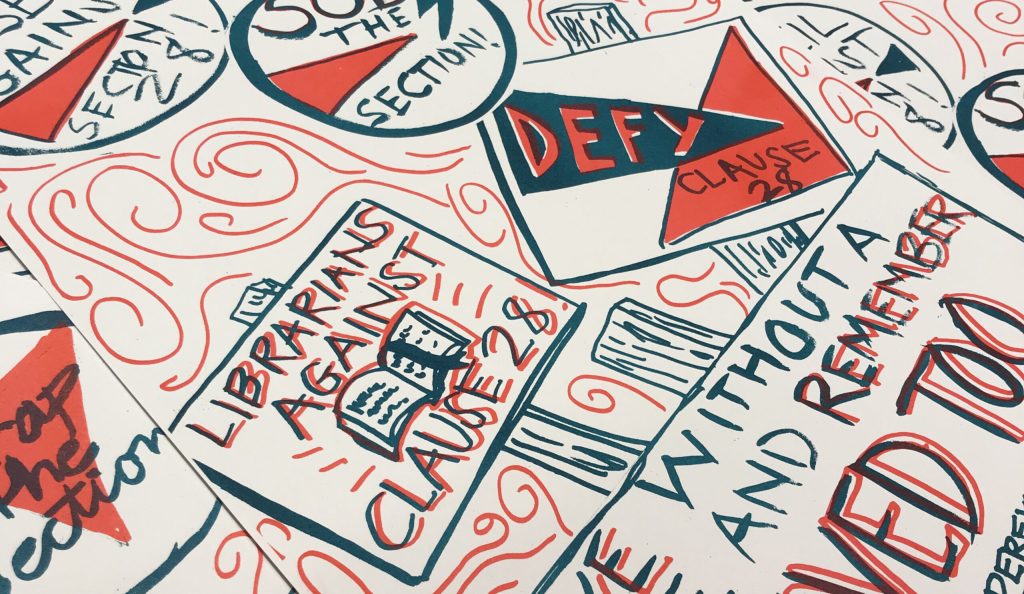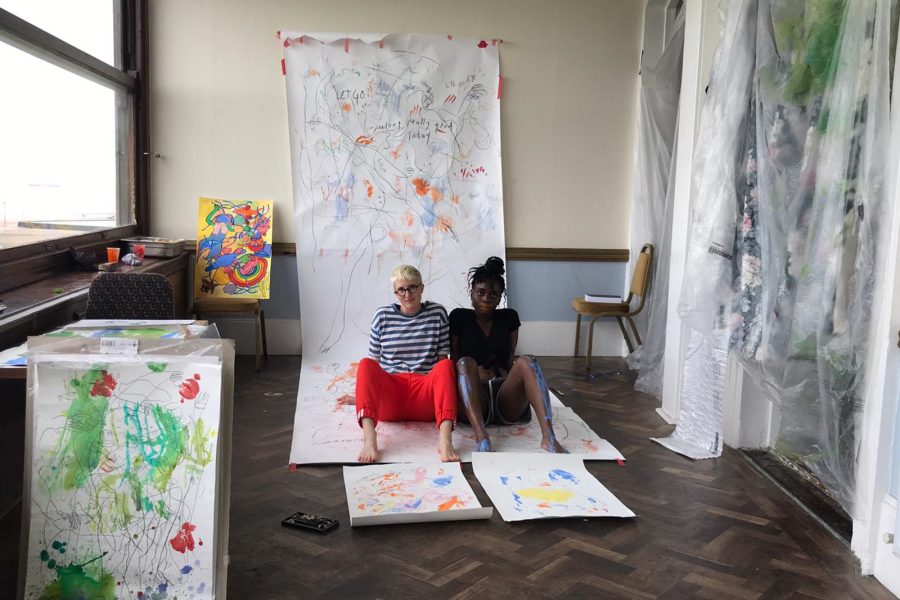What drew you to each other’s practice?
BP: Graham’s practice exists at the crossroads of his own work, and his effort in creating queer community through curating of group shows at his venue Trafalgar Avenue. I love that he balances his deeply personal, beautiful paintings and sculptures with a love for community, as that is exactly the kind of dynamic that I am always striving for with my printing and publications—to use paper as a surface for wrangling together different histories and experiences of queer struggle and liberation, creating dialogue and continuity between the living and the dead. I think Graham and I both have a sense of art as being an important source of information and even skills-sharing for the communities that it draws to itself. The art we create demands space for people to rest and be replenished, and that work is only as good as the relationships it fosters, so we hit it off instantly when it came to considering how to make art in the wake of deeply repressive legislation.
GM: Brooke’s practice is rooted in archival research and antiquing through which they explore print media and obsolete technologies – interests I share and explore in my own work. Brooke’s ability to effortlessly weave the scholarly, the artistic, and activism within their work, challenging conventions around what constitutes our practice and the limitations we place upon ourselves, has also encouraged me to think more broadly about the various approaches to making that my practice encompasses, and continues to inspire me. On meeting Brooke, I was immediately drawn to their warmth and generosity of spirit, and to their enthusiasm for collaborative working and collective organisation. Brooke’s encyclopedic knowledge of queer history and interest in the history of social movements in general made me all the more excited to work with them.
How will you use the 1:1 FUND?
The 1:1 FUND will be used to make a printed edition based off of Graham’s research and writing about Section 28, with Brooke’s additional research and editing and design. The book in turn will mark the launch point for a wider series of discussions about life for LGBTQIA+ people in the wake of Section 28’s repeal in the UK.
Why did you choose the idea you will be working on?
Section 28 was effective as an alienating and oppressive form of censorship in creating a culture of silence around sexual identity in public institutions and state education, which had an immeasurable impact on people of our generation. Yet it somehow slipped from the public consciousness upon its repeal, without consideration for those it affected and with nothing by way of redress. This is something that we both seek to address in our respective practices – the publication therefore presents the perfect opportunity for us to collaborate.
What is the one thing you most hope to gain from undertaking this work?
The goal of the publication is, ultimately, a call for community participation. We want to use it as a rallying point for a series of workshops relating to Section 28, its legacies, through which we would like to engage with individuals and communities impacted by the legislation. And finally, we want for the project to serve as the point of departure for our future collaboration on a long-term oral history project, through which we aim to collect and record testimony from individuals in relation to their experiences under Section 28 in the UK.
Brooke Palmieri is a Philadelphia native living in London. They have worked on both sides of the Atlantic in libraries, bookshops, and as a writer, educator, and volunteer in archives and special collections, both institutional and community-run. In the summer of 2018, Palmieri founded Camp Books, after a lifetime of working with books, and an abiding interest the history of social movements in general, and the gender non-conforming people who participated in them in particular. Palmieri has experience cataloguing private archives & collections, and consulting and developing exhibitions. Most recently they served on the Advisory Board for Queer Between the Covers (2018), and curated Women Against Imperialism: Posters Used in Protest (2019) at the Bower, where they serve on the advisory board.
Graham Martin is a Scottish artist living and working in London. He graduated from the Royal College of Art with an MA in Painting in 2021, following studies at Université Paris II Panthéon-Assas (2009-2010), Edinburgh University (2003-2007), and Edinburgh College of Art (2001-2003). He is a 2020 recipient of the Elizabeth Greenshields Foundation Grant and most recently his work has been included in group shows ‘Tomorrow 2021’ (White Cube, London) and ‘London Grads Now’ (Saatchi Gallery, London). In 2021, he launched Trafalgar Avenue with his partner Carlos Silveria, a new artist-led gallery and project space in Southeast London and Margate. Recent exhibitions at the gallery include ‘Handful of Dust’ a solo exhibition by Dan Howard-Birt, and the group exhibition ‘Pleasure Scene’.

